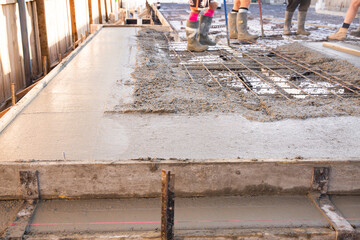Excavation services play a crucial role in construction, landscaping, and infrastructure development projects. Proper excavation ensures that a site is prepared for foundations, utilities, roads, and other essential structures, providing stability and safety for long-term use. These services involve removing soil, rocks, debris, and other materials to shape and level land according to project specifications. Whether the project is residential, commercial, or industrial, professional excavation services are essential for achieving high-quality results while minimizing risks and delays. Visit Website for more information.

Excavation is more than simply digging a hole or leveling a plot of land. It requires detailed planning, technical knowledge, and specialized equipment to handle varying soil types, terrain conditions, and project requirements. Without proper excavation, foundations may be unstable, water drainage can become problematic, and construction timelines may be delayed. Professional excavation teams analyze soil composition, site slope, and load-bearing requirements to ensure that each project is executed safely and efficiently. This preparation is essential for supporting structures, reducing the risk of settling or collapse, and ensuring that all subsequent construction stages proceed smoothly.
One of the key benefits of excavation services is the creation of a stable foundation for construction projects. Excavation involves removing loose or unstable soil, compacting the ground, and ensuring proper grading to support buildings, roads, and other structures. A well-prepared site reduces the risk of foundation shifting, cracking, or water damage over time. Foundations that are laid on properly excavated land are more durable and require fewer repairs, providing long-term value and reliability for property owners and developers.
Excavation services also enhance site accessibility and workflow efficiency. Overgrown, uneven, or debris-filled land can impede construction activities, making it difficult for heavy machinery, trucks, and personnel to operate effectively. Clearing and leveling the site allows construction crews to move freely, reduces equipment wear, and improves overall project productivity. In addition, excavation can facilitate the installation of utilities such as water, sewer, and electrical systems by providing accurate trenches and pathways that comply with design specifications and safety regulations.
Modern excavation projects often incorporate a variety of specialized techniques and equipment. Bulldozers, backhoes, excavators, and skid steers are commonly used to remove soil, rocks, and debris efficiently. For precision work, crews may use smaller machinery or manual methods to avoid damaging nearby structures or sensitive areas. Excavation can also include grading, trenching, and soil stabilization, depending on the needs of the project. These techniques ensure that the site meets engineering requirements and is safe for construction activities.
Common Types of Excavation Services
- Site Preparation and Clearing – Removing trees, rocks, vegetation, and debris to prepare land for construction or landscaping.
- Foundation Excavation – Digging trenches and pits for building foundations, basements, and footings.
- Trenching and Utility Installation – Creating trenches for water, sewer, electrical, and communication lines.
- Grading and Leveling – Smoothing and leveling land to ensure proper drainage and stability.
- Road and Driveway Excavation – Preparing surfaces for asphalt, concrete, or gravel roads.
- Pool and Pond Excavation – Removing soil for residential or commercial water features.
- Drainage and Retention Excavation – Installing systems to manage stormwater and prevent flooding.
- Demolition Excavation – Clearing debris from structures that have been removed or partially demolished.
Excavation services are also critical for managing water flow and preventing soil erosion. Proper grading and drainage systems prevent water from pooling around foundations, roads, or landscapes, which could otherwise compromise structural integrity. Excavation teams often work with engineers to design retention ponds, drainage channels, or swales that control water runoff. These systems protect property, reduce maintenance costs, and prevent environmental damage, making excavation an essential step in responsible site development.
Safety is a central concern in all excavation projects. Excavation sites can pose hazards such as cave-ins, falling debris, and unstable soil. Professional crews follow strict safety protocols, including shoring, benching, and sloping techniques, to prevent accidents and protect workers. Equipment operators are trained to navigate uneven terrain and handle heavy machinery safely. By prioritizing safety, excavation services reduce the risk of injury and ensure that projects proceed without costly delays or legal complications.
Excavation services also have a direct impact on project efficiency and cost management. A poorly prepared site can result in delays, equipment damage, and higher labor costs. Professional excavation ensures that the land is properly prepared the first time, reducing the likelihood of unexpected issues during construction. By investing in skilled excavation services, property owners and developers save both time and money, while ensuring that the project meets design specifications and regulatory standards.
In addition to traditional construction projects, excavation services are essential for agricultural and landscaping applications. Farmers and landowners often rely on excavation to create irrigation channels, ponds, terraces, and drainage systems. Landscapers use excavation to shape terrain, build retaining walls, and prepare areas for planting or decorative features. These services allow land to be used more efficiently and sustainably, enhancing productivity and property value.
Environmental considerations are also a key component of modern excavation services. Removing large amounts of soil and vegetation can disrupt ecosystems if not done responsibly. Professional excavation teams implement best practices to minimize environmental impact, such as preserving natural water courses, replanting vegetation, and preventing soil erosion. Sustainable excavation practices ensure that land is developed responsibly, balancing human use with environmental protection.
Trenching is another specialized aspect of excavation that requires careful planning and execution. Utility trenches must be dug with precise depth and alignment to accommodate pipes, cables, or drainage systems. Incorrectly installed trenches can lead to leaks, utility failures, or structural problems. Skilled excavation crews use surveying equipment, markers, and GPS systems to ensure accuracy, reducing errors and avoiding costly repairs. Proper trenching also ensures compliance with safety regulations, protecting both workers and future users of the infrastructure.
Excavation services often complement other construction activities, such as foundation pouring, grading, and landscaping. By coordinating excavation with other trades, construction teams can streamline the workflow and reduce project timelines. This collaboration allows for efficient material handling, reduces the need for rework, and ensures that each stage of construction progresses smoothly. The result is a safer, faster, and more cost-effective project from start to finish.
When to Hire Professional Excavation Services
- Construction of New Buildings – Preparing foundations, basements, and footings for residential, commercial, or industrial structures.
- Road, Driveway, or Parking Lot Projects – Excavating surfaces for proper leveling and material installation.
- Utility Installation – Trenching for water, sewer, electrical, or communication lines.
- Landscaping and Water Features – Excavating ponds, pools, terraces, or retaining walls.
- Drainage and Flood Prevention – Creating swales, channels, and retention systems to manage stormwater.
- Site Remediation or Cleanup – Removing debris, contaminated soil, or old structures from a property.
- Agricultural Land Preparation – Creating irrigation systems, terraces, or planting beds.
- Demolition Support – Clearing and excavating debris following the removal of existing structures.
Excavation is an essential component of modern construction and land development, offering both functional and economic benefits. Proper excavation provides a stable foundation, improves water management, enhances accessibility, and prepares land for further development. Professional services reduce risks associated with unstable soil, heavy machinery, and environmental impacts, ensuring that projects are completed safely and efficiently. From small residential lots to large-scale industrial developments, excavation services are indispensable for achieving high-quality, long-lasting results.
Investing in professional excavation services is a smart decision for property owners, developers, and contractors. These services not only lay the groundwork for construction success but also contribute to project efficiency, cost savings, and safety. Whether preparing land for a new building, a landscaping project, agricultural use, or infrastructure development, professional excavation ensures that every step is executed correctly. With specialized equipment, technical expertise, and a focus on safety and sustainability, excavation services provide the foundation for successful projects of all sizes.
In conclusion, excavation services are a vital part of land development and construction projects, offering safety, stability, efficiency, and environmental responsibility. From site preparation to trenching, grading, and debris removal, professional excavation ensures that land is properly prepared for its intended use. With careful planning, skilled operators, and specialized equipment, excavation services transform raw land into a safe, usable, and productive property. By relying on experienced excavation professionals, property owners and developers can achieve long-term results that meet both functional and aesthetic goals, creating a strong foundation for future success.
